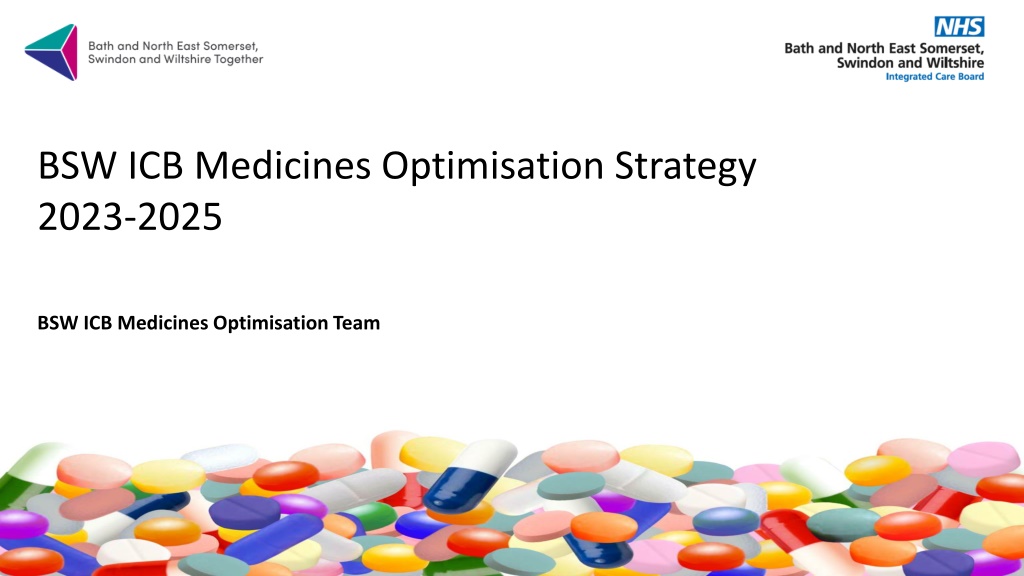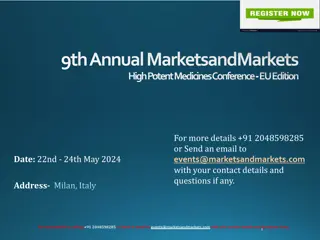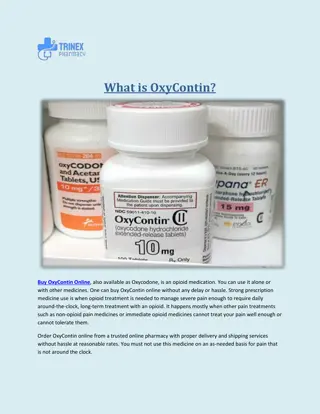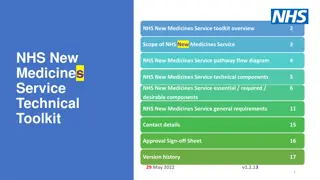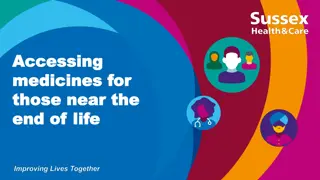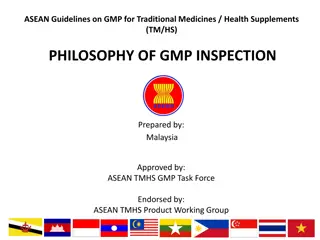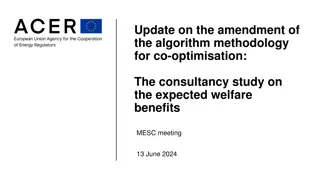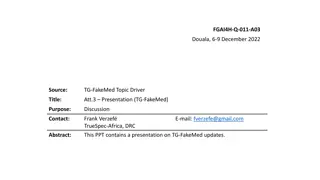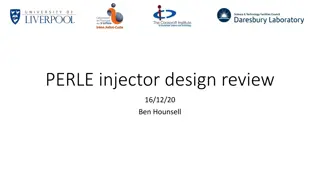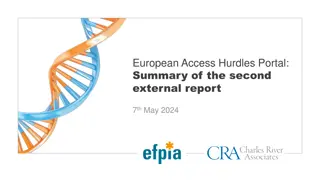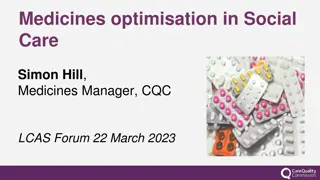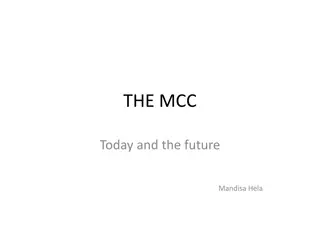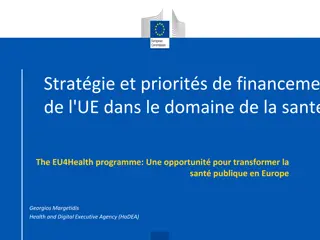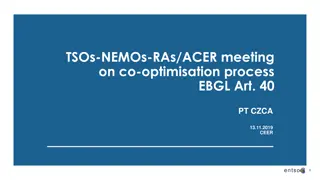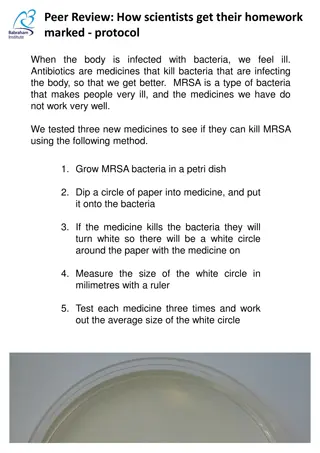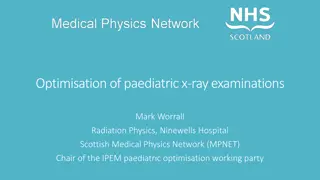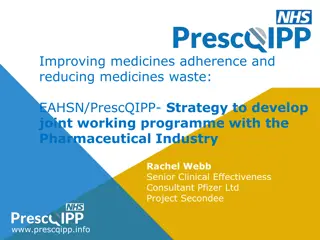Medicines Optimisation Strategy 2023-2025
Our strategy focuses on enhancing patient safety, delivering value, improving outcomes, supporting equity, and increasing capacity in healthcare through optimal use of medicines. It aims to reduce health inequalities and enhance sustainability by ensuring patients receive the best-quality outcomes from their prescribed medicines.
Download Presentation

Please find below an Image/Link to download the presentation.
The content on the website is provided AS IS for your information and personal use only. It may not be sold, licensed, or shared on other websites without obtaining consent from the author.If you encounter any issues during the download, it is possible that the publisher has removed the file from their server.
You are allowed to download the files provided on this website for personal or commercial use, subject to the condition that they are used lawfully. All files are the property of their respective owners.
The content on the website is provided AS IS for your information and personal use only. It may not be sold, licensed, or shared on other websites without obtaining consent from the author.
E N D
Presentation Transcript
BSW ICB Medicines Optimisation Strategy 2023-2025 BSW ICB Medicines Optimisation Team
Our ambition is for medicines and pharmacy teams to be at the heart of system healthcare transformation to deliver safe, optimal, innovative patient care.
Our strategy is based on alignment to the following integrated care board (ICB) priorities: Improving medicines-related patient safety Delivering value to the system Improving patient outcomes Supporting equity of access Supporting NHS recovery through increasing capacity Reducing health inequalities Improving sustainability
Medicines play a crucial role in maintaining health, preventing illness, managing chronic conditions and curing disease. In a time of significant economic and demographic challenge, it is crucial that our patients get the best quality outcomes from the medicines that they are prescribed. Our vision for medicines optimisation within BSW ICB delivers a patient-focussed approach to getting the best possible health benefits from the investment made in medicines. This requires a holistic approach, an enhanced level of person-centred care delivery, and partnership between clinical professionals and patients. Our aim is to ensure that the right patient gets the right medicine, at the right time (even when that means no medicine). We will focus on wider health outcomes including improved clinical outcomes for patients, reducing avoidable hospital admissions related to medicines (HARMs), reducing health inequalities & utilising a population health management approach. A patient centred approach will in turn ensure we get the best from our investment in medicines, patients live longer, healthier lives. It will also support the system to achieve its aims in transforming care by improving capacity through admission avoidance, earlier discharge and supporting high quality access to care in alternative settings.
Medicines Statistics And Why They Matter When moving between care settings 30-70% of patients have an error or unintentional change to medicines Up to 10% of unplanned hospital admissions are due to medication BSW ICB spends 148 Million on medicines annually 6.8 spent on low priority medicines during 2022-23 Nationally over 237 million medicines errors each year costing 98 million and 1,700 lives BSW now one of the lowest prescribers on the country for anticholinergic burden 15% readmissions are due to a medicines related issue After staffing this is our biggest cost BSW is in the lowest quartile for average no. of medicines prescribed per patient even with above average population age As many as 50% of patients do not take their medicines as intended
Medicines Statistics And Why They Matter When moving between care settings 30-70% of patients have an error or unintentional change to medicines Up to 10% of unplanned hospital admissions are due to medication BSW ICB spends 148 Million on medicines annually 6.8 spent on low priority medicines during 2022-23 After staffing this is our biggest cost BSW now one of the lowest prescribers on the country for anticholinergic burden Nationally over 237 million medicines errors each year costing 98 million and 1,700 lives 15% readmissions are due to a medicines related issue As many as 50% of patients do not take their medicines as intended BSW is in the lowest quartile for average no. of medicines prescribed per patient even with above average population age
VISION Patient Person centred care, shared decision making and outcomes that matter High quality, safe use of medicines System wide approach to reduce avoidable harm from medicines Transformative Medicines at heart of system change Driven by data, focus on improving population health, reducing inequalities Population health management Delivering best value from medicines Evidence based, cost effective, best patient outcomes Whole system approach Workforce, education and training, formulary and guidelines, digital
Person Centred Care & Shared Decision making Improve patient engagement and responsibility in decisions around medicines, person centered treatment goals that matter to the individual Improved use of technology to support decision making Focus on prevention, lifestyle interventions and earlier intervention to reduce the impact of long -term conditions Holistic approach, alternative interventions to medicines, encourage self-care Patient education and awareness campaigns Systematic structured medication reviews and deprescribing in all settings, to optimise medicines use reduce inappropriate polypharmacy and medication related harm
High Quality Safe Use of Medicines Focus on improving patient outcomes, health and reducing hospital admissions related to medicines or sub- optimal quality prescribing. Use of medicines driven by clinical evidence System wide approach to medicines safety improving medicines safety by sharing reporting and learning from medicines incidents. Reduce severe avoidable medication related harm by 50% in line with WHO target and reduce hospital admissions (and readmissions) related to medicines (HARMs) Reduce medicines errors at transition between care settings by improving communication with an ultimate goal of a single shared patient record. Reduce harm from high risk medicines e.g. anticoagulants, prescribed dependence forming medicines, sodium valproate in women of child bearing age Reduce harmful polypharmacy through deprescribing Supporting and reviewing/improving prescribing in targeted high risk groups Develop a system Antimicrobial Stewardship Strategy to promote appropriate antimicrobial use
Population Health Management Work programme driven by data; prescribing data linked to patient outcome and admission data to demonstrate the full impact that improved prescribing quality can have. Focus on improving population health, reducing inequalities and variance through high quality use of medicines. Right medicine, right place, right time. Equitable patient access to medicines and medicines advice and support, recognising the challenges of our large, rural geography and population demographics. Target interventions to communities, populations or localities that have identified need. Support the prevention agenda in health, social care, environmental and local authority public health.
Delivering Best Value From Medicines Deliver a value based approach to medicines and strive to ensure we get the best value from our investment. Delivery of NHSE national medicines opportunities Cost effective use of medicines (all sectors) through adherence to a system-wide single formulary, aiming for >90% adherence in all settings Reduce medicines waste Reduce low priority prescribing medicines and promote appropriate self care Maximise use of best value biologics Ensure a shared approach to patient pathways and guidelines to reduce inequalities and ensure equitable prescribing and access to medicines wherever a patient accesses our system Reduce the environmental impact of medicines support delivery NHS net zero carbon impact by 2040 target Consider medicines impacts on whole system, patient outcomes, admission avoidance, access as well as on prescribing budgets
A Whole System Approach to Medicines optimisation Shared medicines governance structure across ICS, recognised by all organisations Pharmacy workforce resilience, integration and development (NHS, primary care and community pharmacy). Ensure that we have the right workforce that has ability, skills and flexibility to deliver the system requirements. Work to align with ICS People Strategy Provision of multisectoral training programmes and roles, including specialist and consultant pharmacist roles. Education and upskilling embedded in each clinical priority programme, supported by local specialists delivered to prescribers, allied health professionals, pharmacy teams, patients and public across all sectors Shared digital solutions across providers to improve efficiencies and safety around medicines. Right access to the right information at the right time across all sectors. Link to the ICS digital strategy - Digital technologies are an underpinning enabler for sharing information and providing safer care across our system
Transformative, innovative approach to medicines Medicines and pharmacy colleagues embedded in delivery and support of the wider system programmes, pharmacy representation embedded within the system priorities. Medicines is the single most common intervention so needs to be at heart of system transformation and service redesign Recognise gaps and challenges in commissioned services that impact on medicines use and support system partners in addressing these. Commit to optimal use of new innovative medicines and technologies Better utilise the skills of the pharmacy workforce in all sectors including community pharmacy to support system recovery and delivery of our shared system priorities Change the culture relating to use of medicines, both with clinicians and the public Health and Care teams, clinical and non-clinical, support delivery of the Medicines Optimisation principles across the ICS
Programme Priorities 2023-24 NHS Providers Population Health/ Prevention Medicines Quality Medicines Safety Value Workforce and Digital Integrated System BSW formulary Shared medicines safety governance & learning from incidents Workforce plan CVD Hypertension / AF case finding and treatment Community Pharmacy Consultation Service (CPCS) Virtual ward, safe use of medicines Medicines cost efficiency switch programme Recruitment and retention Diabetes Inappropriate polypharmacy and de- prescribing SystemPriorities Outpatients Parenteral Antimicrobial Therapy Respiratory Pharmacy First Dependence forming medicines (high dose opioids) Trainee pharmacist and undergraduate training Diabetes blood glucose testing, needles / lancets STOMP, STAMP, dementia BSW formulary compliance Best Value Biologics Supporting public health initiatives Urgent and Emergency care Anticoagulants Technician training Antimicrobial Stewardship Strategy & oversight End of life medicines Anticoagulants Long term conditions Sodium valproate in women (&men) pregnancy risks Workforce training and development Admission avoidance Reducing medicines waste Medicines contractual frameworks (exend+) Reducing inequalities HCP education Structured Medication Reviews Pharmacy Professionals Networks Portfolio/Joint Roles Signposting and self- care Respiratory- greener inhalers, overuse of SABA Aseptics review Reducing HARMs Patient education campaigns Discharge Medicines Service Reducing serious medicines harm Polypharmacy Low value medicines/Self Care EPMA / EPS across Trusts Shared care prescribing principles Local commissioned service Antimicrobial strategy Oral nutrition Community Pharmacy Integration Care settings Delivery of 16 National medicines opportunities
